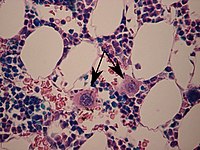
Photo from wikipedia
Visualizing cell behavior and effector function on a single cell level has been crucial for understanding key aspects of mammalian biology. Due to their small size, large number and rapid… Click to show full abstract
Visualizing cell behavior and effector function on a single cell level has been crucial for understanding key aspects of mammalian biology. Due to their small size, large number and rapid recruitment into thrombi, there is a lack of data on fate and behavior of individual platelets in thrombosis and hemostasis. Here we report the use of platelet lineage restricted multi-color reporter mouse strains to delineate platelet function on a single cell level. We show that genetic labeling allows for single platelet and megakaryocyte tracking and morphological analysis in vivo and in vitro, while not affecting lineage functions. Using Credriven Confetti expression, we provide insights into temporal gene expression patterns as well as spatial clustering of megakaryocytes in the bone marrow. In the vasculature, shape analysis of activated platelets recruited to thrombi identifies ubiquitous filopodia formation with no evidence of lamellipodia formation. Single cell tracking in complex thrombi reveals prominent myosin-dependent motility of platelets and highlights thrombus formation as a highly dynamic process amenable to modification and intervention of the acto-myosin cytoskeleton. Platelet function assays combining flow cytrometry, as well as in vivo, ex vivo and in vitro imaging show unaltered platelet functions of multicolor reporter mice compared to WT controls. In conclusion, platelet lineage multicolor reporter mice prove useful in furthering our understanding of platelet and megakaryocyte biology on a single cell level.
Journal Title: Haematologica
Year Published: 2021
Link to full text (if available)
Share on Social Media: Sign Up to like & get
recommendations!